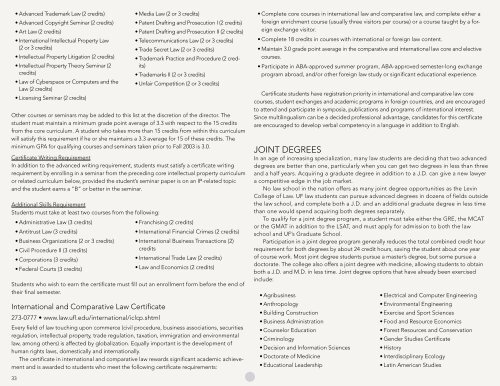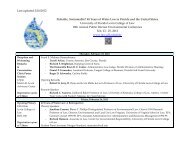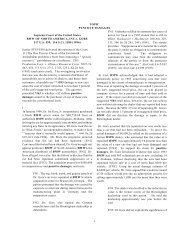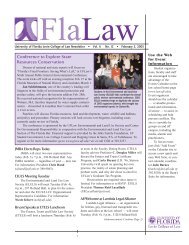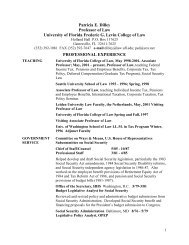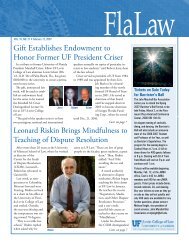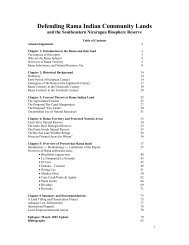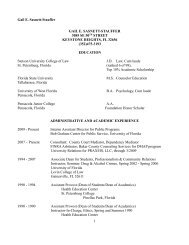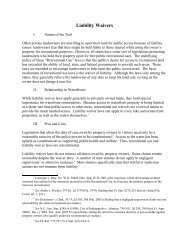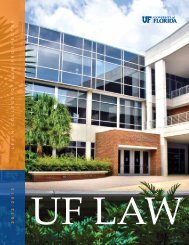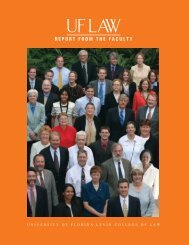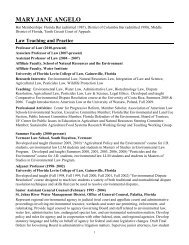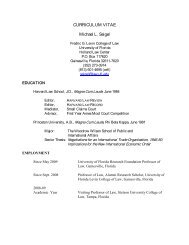Levin College of Law - University of Florida
Levin College of Law - University of Florida
Levin College of Law - University of Florida
You also want an ePaper? Increase the reach of your titles
YUMPU automatically turns print PDFs into web optimized ePapers that Google loves.
• Advanced Trademark <strong>Law</strong> (2 credits)<br />
• Advanced Copyright Seminar (2 credits)<br />
• Art <strong>Law</strong> (2 credits)<br />
• International Intellectual Property <strong>Law</strong><br />
(2 or 3 credits)<br />
• Intellectual Property Litigation (2 credits)<br />
• Intellectual Property Theory Seminar (2<br />
credits)<br />
• <strong>Law</strong> <strong>of</strong> Cyberspace or Computers and the<br />
<strong>Law</strong> (2 credits)<br />
• Licensing Seminar (2 credits)<br />
Other courses or seminars may be added to this list at the discretion <strong>of</strong> the director. The<br />
student must maintain a minimum grade point average <strong>of</strong> 3.3 with respect to the 15 credits<br />
from the core curriculum. A student who takes more than 15 credits from within this curriculum<br />
will satisfy this requirement if he or she maintains a 3.3 average for 15 <strong>of</strong> these credits. The<br />
minimum GPA for qualifying courses and seminars taken prior to Fall 2003 is 3.0.<br />
Certificate Writing Requirement<br />
In addition to the advanced writing requirement, students must satisfy a certificate writing<br />
requirement by enrolling in a seminar from the preceding core intellectual property curriculum<br />
or related curriculum below, provided the student’s seminar paper is on an IP-related topic<br />
and the student earns a “B” or better in the seminar.<br />
Additional Skills Requirement<br />
Students must take at least two courses from the following:<br />
• Administrative <strong>Law</strong> (3 credits)<br />
• Franchising (2 credits)<br />
• Antitrust <strong>Law</strong> (3 credits)<br />
• International Financial Crimes (2 credits)<br />
• Business Organizations (2 or 3 credits) • International Business Transactions (2)<br />
• Civil Procedure II (3 credits)<br />
credits<br />
• Corporations (3 credits)<br />
• International Trade <strong>Law</strong> (2 credits)<br />
• Federal Courts (3 credits)<br />
• <strong>Law</strong> and Economics (2 credits)<br />
Students who wish to earn the certificate must fill out an enrollment form before the end <strong>of</strong><br />
their final semester.<br />
International and Comparative <strong>Law</strong> Certificate<br />
273-0777 • www.law.ufl.edu/international/iclcp.shtml<br />
• Media <strong>Law</strong> (2 or 3 credits)<br />
• Patent Drafting and Prosecution I (2 credits)<br />
• Patent Drafting and Prosecution II (2 credits)<br />
• Telecommunications <strong>Law</strong> (2 or 3 credits)<br />
• Trade Secret <strong>Law</strong> (2 or 3 credits)<br />
• Trademark Practice and Procedure (2 credits)<br />
• Trademarks II (2 or 3 credits)<br />
• Unfair Competition (2 or 3 credits)<br />
Every field <strong>of</strong> law touching upon commerce (civil procedure, business associations, securities<br />
regulation, intellectual property, trade regulation, taxation, immigration and environmental<br />
law, among others) is affected by globalization. Equally important is the development <strong>of</strong><br />
human rights laws, domestically and internationally.<br />
The certificate in international and comparative law rewards significant academic achievement<br />
and is awarded to students who meet the following certificate requirements:<br />
• Complete core courses in international law and comparative law, and complete either a<br />
foreign enrichment course (usually three visitors per course) or a course taught by a foreign<br />
exchange visitor.<br />
• Complete 18 credits in courses with international or foreign law content.<br />
• Maintain 3.0 grade point average in the comparative and international law core and elective<br />
courses.<br />
• Participate in ABA-approved summer program, ABA-approved semester-long exchange<br />
program abroad, and/or other foreign law study or significant educational experience.<br />
Certificate students have registration priority in international and comparative law core<br />
courses, student exchanges and academic programs in foreign countries, and are encouraged<br />
to attend and participate in symposia, publications and programs <strong>of</strong> international interest.<br />
Since multilingualism can be a decided pr<strong>of</strong>essional advantage, candidates for this certificate<br />
are encouraged to develop verbal competency in a language in addition to English.<br />
Joint Degrees<br />
In an age <strong>of</strong> increasing specialization, many law students are deciding that two advanced<br />
degrees are better than one, particularly when you can get two degrees in less than three<br />
and a half years. Acquiring a graduate degree in addition to a J.D. can give a new lawyer<br />
a competitive edge in the job market.<br />
No law school in the nation <strong>of</strong>fers as many joint degree opportunities as the <strong>Levin</strong><br />
<strong>College</strong> <strong>of</strong> <strong>Law</strong>. UF law students can pursue advanced degrees in dozens <strong>of</strong> fields outside<br />
the law school, and complete both a J.D. and an additional graduate degree in less time<br />
than one would spend acquiring both degrees separately.<br />
To qualify for a joint degree program, a student must take either the GRE, the MCAT<br />
or the GMAT in addition to the LSAT, and must apply for admission to both the law<br />
school and UF’s Graduate School.<br />
Participation in a joint degree program generally reduces the total combined credit hour<br />
requirement for both degrees by about 24 credit hours, saving the student about one year<br />
<strong>of</strong> course work. Most joint degree students pursue a master’s degree, but some pursue a<br />
doctorate. The college also <strong>of</strong>fers a joint degree with medicine, allowing students to obtain<br />
both a J.D. and M.D. in less time. Joint degree options that have already been exercised<br />
include:<br />
• Agribusiness<br />
• Anthropology<br />
• Building Construction<br />
• Business Administration<br />
• Counselor Education<br />
• Criminology<br />
• Decision and Information Sciences<br />
• Doctorate <strong>of</strong> Medicine<br />
• Educational Leadership<br />
• Electrical and Computer Engineering<br />
• Environmental Engineering<br />
• Exercise and Sport Sciences<br />
• Food and Resource Economics<br />
• Forest Resources and Conservation<br />
• Gender Studies Certificate<br />
• History<br />
• Interdisciplinary Ecology<br />
• Latin American Studies<br />
33


